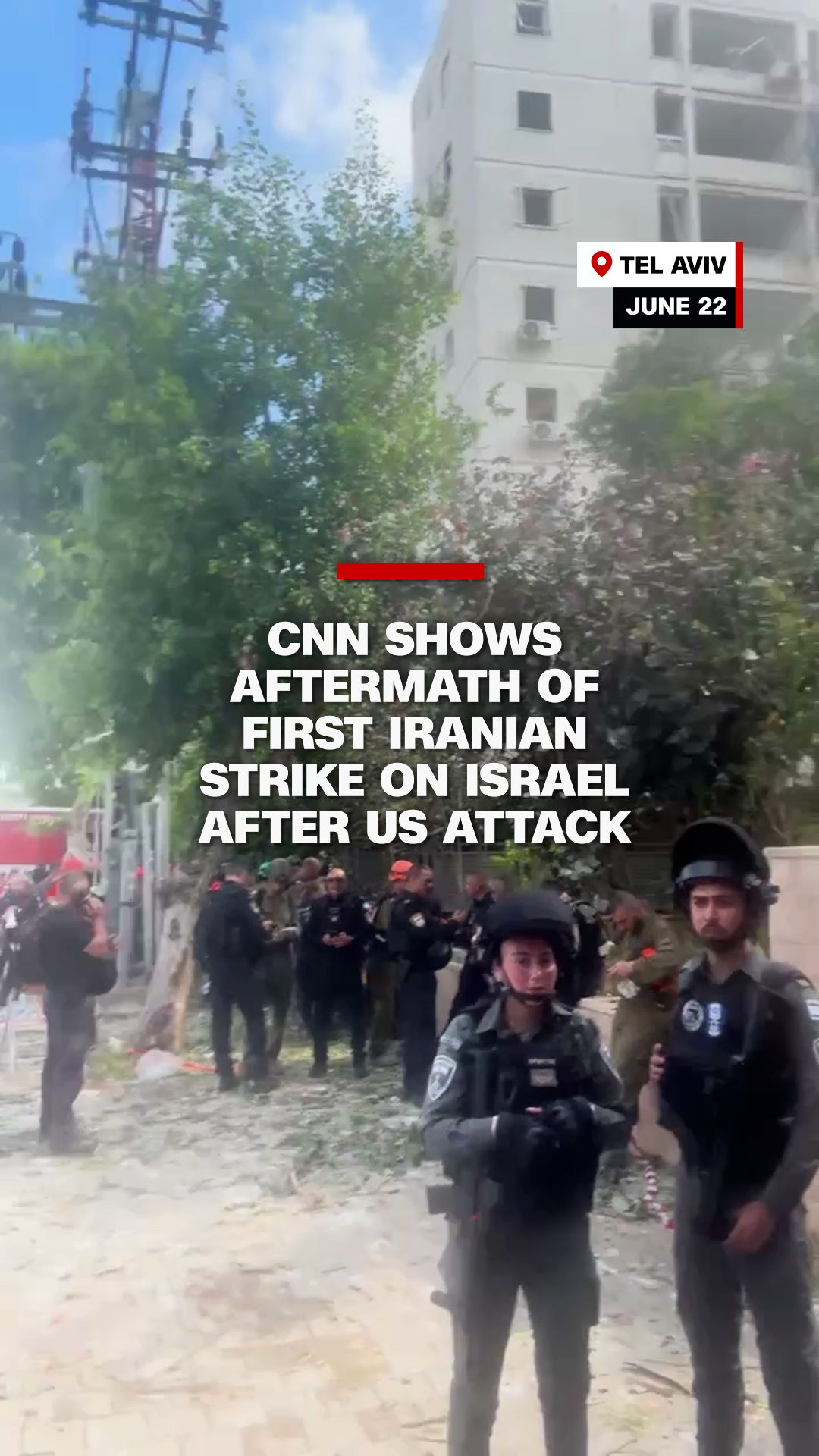Articles in this Cluster
22-06-2025
CNN’s Nic Robertson reports from Tel Aviv on the aftermath of Iran’s first missile strike on Israel following a US attack, showing damage to an apartment building and active rescue efforts. Related segments cover additional Iranian strikes, including one that hit near a major medical center in Beersheba (no deaths reported) and an attack on Haifa that wounded at least 17. The broader context includes halted commercial flights, Americans struggling to leave Israel, US deliberations over involvement, statements from Israeli officials calling out Iran’s leadership, and on-the-ground reporting from Tehran as both sides trade strikes.
Entities: Iran, Israel, CNN, Nic Robertson, Tel Aviv • Tone: urgent • Sentiment: negative • Intent: inform
22-06-2025
The article outlines Israel’s potential strategies to neutralize Iran’s deeply buried Fordow nuclear site if the U.S. declines to act. Options include deploying elite Shaldag commandos to infiltrate and demolish the facility, as they did against an Iranian-backed underground missile site in Syria; cyber operations akin to the Stuxnet attack that sabotaged Natanz; and cutting power to disable centrifuges. Former Israeli Military Intelligence chief Amos Yadlin highlights past Israeli solo operations (Osirak in 1981, Syria in 2007) and argues that striking Fordow could shorten the war and deter adversaries. While Israel prefers U.S. B-2 bombers and heavy bunker-busters, Prime Minister Netanyahu suggests Israel has alternative capabilities if it must act alone.
Entities: Israel, Iran, Fordow nuclear site, Shaldag commandos, Stuxnet • Tone: analytical • Sentiment: neutral • Intent: analyze
22-06-2025
On day 10 of the Israel-Iran war, UN chief António Guterres warned the Security Council that US strikes on Iranian nuclear facilities risk a dangerous cycle of “retaliation after retaliation.” Iran condemned the US attacks, vowed to defend itself by “all necessary means,” and said injured from the strikes showed no radioactive contamination. An adviser to Ayatollah Khamenei asserted Iran’s enriched uranium stockpile and know-how remain intact despite damage to sites. The US, with officials including Secretary of State Marco Rubio and VP JD Vance, claimed the strikes significantly set back Iran’s nuclear program while insisting Washington is not at war with Iran and remains open to talks if Tehran forgoes enrichment. Israel said it struck dozens of targets across Iran, including a long-range missile command site in Yazd, and Israeli voices expressed satisfaction with US support. Ukraine backed the strikes as a measure to prevent a nuclear threat. The UN Security Council convened at Iran’s request to address the escalation.
Entities: United Nations, António Guterres, United States, Iran, Israel • Tone: analytical • Sentiment: negative • Intent: inform
22-06-2025
The UN Security Council met at Iran’s request after U.S. strikes hit three Iranian nuclear-related sites, with Russia, China, and Pakistan circulating a draft resolution calling for an immediate, unconditional Middle East ceasefire and condemning attacks on nuclear facilities. The U.S. is expected to oppose the text, which does not name the U.S. or Israel. UN chief Antonio Guterres warned of escalating retaliation and urged a return to negotiations on Iran’s nuclear program. IAEA head Rafael Grossi reported visible damage at Fordow, Isfahan, and Natanz but no detected off-site radiation increases; full underground impact remains unclear. Iran condemned the strikes as unlawful aggression, while Israel defended the U.S. and its own actions as enhancing global security. Votes and timing on the draft resolution remain uncertain.
Entities: United Nations Security Council, United States, Iran, Russia, China • Tone: analytical • Sentiment: neutral • Intent: inform
22-06-2025
Iran launched at least 27 ballistic missiles at Israel in two waves on Sunday, injuring at least 86 people, including children, and striking about 10 locations in northern and central Israel such as Haifa, Tel Aviv, and near Jerusalem. Sirens and shelter orders were briefly issued before being lifted. Four victims were in critical condition. Israel said its missile defense systems were fully operational. The attack marked Iran’s first retaliation after a major U.S. strike a day earlier that targeted three Iranian nuclear facilities at Fordow, Esfahan, and Natanz.
Entities: Iran, Israel, ballistic missiles, Haifa, Tel Aviv • Tone: urgent • Sentiment: negative • Intent: inform
22-06-2025
Secretary of State Marco Rubio said it’s irrelevant whether U.S. intelligence showed Iran was actively pursuing a nuclear weapon before the U.S. bombed Iranian sites, arguing Iran already had the capabilities and materials to build one. He cited Iran’s enrichment levels and fortified facilities like Fordow as justification, dismissing doubts raised by prior intelligence assessments that Iran hadn’t resumed a weapons program. Rubio emphasized Iran’s history of sponsoring terrorism and past attacks on Americans to argue against trusting Tehran in negotiations, while Israeli leaders claimed clear intelligence of Iranian weaponization efforts.
Entities: Marco Rubio, Iran, United States, Fordow, Israeli leaders • Tone: analytical • Sentiment: negative • Intent: persuade
22-06-2025
The US struck Iran’s three main nuclear sites, prompting initial celebration in Israel over a perceived existential threat being diminished and renewed US-Israel alignment. However, uncertainty and fear of retaliation quickly set in, with concerns Iran could target US bases, Israel’s Dimona nuclear site, or accelerate its nuclear program. Iran condemned the strikes, vowed to maintain its nuclear industry, and suggested risky materials had been removed from Fordow. Israel reinstated a state of emergency—closing schools, workplaces, and the airport—despite a sense of victory and a political boost for Prime Minister Netanyahu amid Gaza war fallout.
Entities: United States, Iran, Israel, Benjamin Netanyahu, Dimona nuclear site • Tone: analytical • Sentiment: negative • Intent: inform
